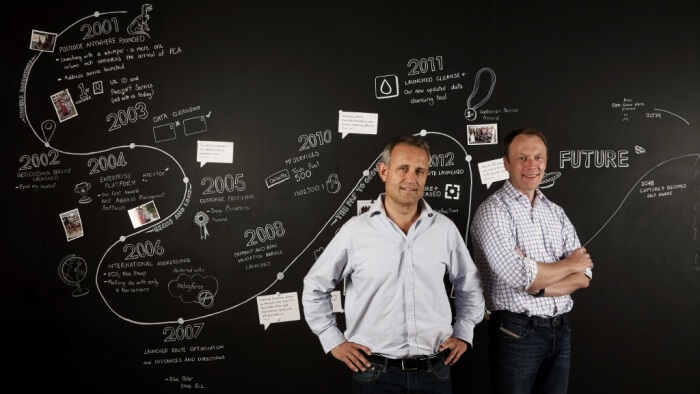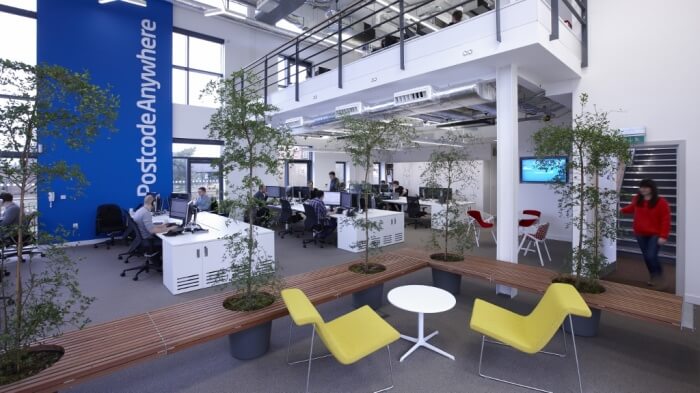Addressing Global Growth: Guy Mucklow's PCA Predict
If you've bought something online, the chances are you've used PCA Predict without even knowing it.

Guy Mucklow (pictured above, right with co-founder Jamie Turner) turned a dotcom boom-era failure into success with PCA Predict, which helps international retailers and other companies locate customers who buy online and want a quick way to upload their delivery address.
Introduce your business
PCA Predict is best described as the 'what's your postcode?' company. If you have ever spoken to anyone in a call centre or typed your postcode to get your delivery address when buying stuff on ASOS or Tesco, that's what we do.
Our service is used by over 11,000 companies to help to provide a better user experience and to make sure that the address details are right so that you get your order first time, every time.
Where did it come from?
PCA Predict wasn’t actually our first business. We originally set up PubOwner.com, a website aimed at making it easier for pub companies to find potential landlords, senior staff and suppliers. Sales never took off, and after burning through our savings, we had to liquidate the business after around nine months.
PCA or Postcode Anywhere, as we were originally known, developed out of the simple idea that we could use the internet to improve the delivery of data. By offering a centrally managed service as an alternative to providing the data on hard media, we could significantly reduce the distribution cost, eliminate the need for manual updates, while keeping the data as fresh as possible.
We knew that there was already an established market for the service within call centres, and had been particularly impressed by an incumbent called QAS (who later sold to Experian), who had done exceptionally well in this market.
We knew, however, that there was a better way of delivering the service and that there was also an emerging opportunity in the nascent ecommerce market which gave us the courage to get going.
Plot the story to today
Over the last 16 years, we have grown PCA Predict from an idea to a $20m (£16.42m) annual turnover business, which dominates its market. All with our own money.
Today we have more than 60 employees based across our UK office in Worcester, New York and Germany servicing over 11,000 customers around the world. Over 40% of the top 500 UK ecommerce businesses use PCA to help improve customer experience in their checkout process, where we can handle over 20 million queries on a busy day.
We now provide our service back to companies like Royal Mail and Canada Post who supply us with their data.
How would you describe market conditions?
It is relatively easy to break into most niche technology markets as things change so fast. The key from our point of view is to stay ahead of the curve by leading the changes. To do that, however, you need to know your market very well and obviously place the right bets.
We are really excited by some of the opportunities in our market which have come from how internet driven processes will enable us to improve how we manage and maintain data.
Some of our biggest opportunities in the immediate future are around the use of search to enable international customers to capture an address where they don’t have a postcode or ZIP code that will easily find it. Our new service called Addressy is designed to capitalise on the strong international demand that we see.
What have been the major bumps in the road and how have you overcome them?
The key is to try and keep these to a minimum and to not 'bet the farm' in the process, which would leave you very vulnerable if you need to change course.
Our major bumps along the road have been in making bets on product developments which have been outside of our core business. The addage that 'if something ain’t broke don’t try to fix it' is very relevant here.
Other regular bumps have come in the form of not having the right people in the right places, not setting up the right processes to enable you to get the best from staff and so on. They're the type of problems that we all face and like many things need constant tweaking to make sure that they are fit for purpose as well as being suitable for the stage of the journey that the business is on.
To pick up on one specific learning from our recent past, we built an expensive direct sales team in an office in New York without giving enough consideration as to whether we had the right solution, the right messages or even whether the channel, which was enterprise customers, was the best place for us start.
After approximately nine months we closed the office and started again with a much smaller team, focussed on building our brand through a mass market approach and in learning how we needed to shape our product and messages to fit the US market. This is proving to be a much less costly approach and far more effective than our first venture.
How do you make sure people find out about your business?
Our focus on the customer is the main reason we have been successful and is core to what we do and as a result, has helped to build up our brand through word of mouth marketing.
We are exceptionally transparent with potential customers in our sales process and do everything to help support customers with technical/integration issues at all stages. Equally, our customers provide a valuable resource to steer the business. They provide input on our product development and website, as well as acting as beta testers for product releases.
We are also very fortunate in that our technology is found in a very visible place. Having a powered by PCA or Addressy (as we are known in North America) badge on our service in the checkout has been really helpful in generating interest for our service.
What is the biggest thrill about running a business?
One of the most exciting things about business is not knowing what’s around the corner.
When starting any business, what you start out doing and what you end up doing are often completely different. That’s largely because as your business matures new opportunities and ideas present themselves, which lead to a change in direction.
The key to good management is to pick the right ones without taking too many risks in the process.
What's your message to government about doing business in the UK?
I believe that we have one of the best environments for growing start up and scale up businesses in the UK and sometimes feel that UK government isn’t given enough credit for the supportive framework that has been created.
We have, for example, tremendous tax incentives in the form of entrepreneurial reliefs, EIS schemes and tax credits to stimulate innovation in R&D.
One area where I feel that government could make more of a difference to the business landscape is by redirecting more of its vast spending power to innovative SMEs and by being generally easier to work with.
What is your biggest mistake?
I've made lots of poor decisions over the years, however, thankfully none have been too radical to have damaged the business. Mistakes are opportunities to learn and improve, and should be expected and tolerated in any business which is looking to push the boundaries.
The main thing is to be able to quickly identify where things are not working out and to change course to get back in track.
What sets your business apart from the rest and how have you nurtured that point of difference?
We have never been afraid of taking a stance in our market and doing things differently to our competitors. It has meant that on two main occasions we have identified an opportunity to improve things for our customers and to extend the potential of our market and on both occasions have had the courage to invest in our future to take advantage of those opportunities.
Doing this has meant that we have developed a reputation for being innovative and setting the pace for others to follow. It's a good place to be if you're are right in your assumptions, however, it can be damaging if you get it wrong.
How do you keep your people keen and motivated?
If there’s one thing that is a regular area of attention in our business - it's employee engagement and motivation. I've learned over the years that it's not just about getting the right people and providing the right financial rewards, but it goes much deeper than that.
For me it's about having collective and individual accountability around specific core business objectives and in being able to measure and monitor against those targets to see whether you are having an impact or not.
Regular progress briefings are key to maintaining engagement and to help colleagues to not only feel that they are part of a team effort, but that their personal efforts are important.
Getting your employees and customers to care about the journey that they are on – is, ultimately, what we’re all looking for. As such, we set up an Employee Initiative Scheme which gives all our employees a stake in the business.
The key for us is to create an environment in which everyone feels and behaves as if they are owners of the business and, as such, can share in the growth in its capital value.
In turn employees will be likely to start treating the business like it’s their own, buying into the vision of the company’s future, aligning passion with success; as ultimately the success of the company will provide a very meaningful impact on the individual’s future.
How do you rate government support for growing businesses and why?
I feel that we have one if the most supportive environments for developing and growing businesses in the UK over anywhere in the world. The role of government in stimulating business, in my view, is to provide the right framework and let things happen. Successful businesses have to learn to support themselves.
What are your top three tips for people starting a business today?
1) To succeed, never take no for an answer.
In business, there are lots of people who might doubt your ability whether through a lack of trust, jealousy or just pure ignorance. The key is that these people can help to fuel your motivation as they need to be proved wrong.
2) I have always subscribed to the view that the best businesses learn from others.
All companies, even those which may not necessarily be considered good, have ways of doing things that could improve your own business. It’s really important as a business to seek out these ideas and make it your duty to find out what is going on around you.
That way, you can constantly be improving. It is also much easier learning from those that have had the experience so that you don’t make their mistakes too.
3) If you want to get people to really care about what you do, you need to take them on a journey that is more than one stop.
Creating the vision or story of where you are now and where you want to be, can be exceptionally motivating for both customers and employees. For your customers it helps them to buy into what you are doing and what it might mean for their own businesses, while for your employees it helps to create a consistent thread or journey of opportunity for their own careers.
Ultimately, people who care about what you’re doing will be more engaged, more motivated and committed to your cause, than those who can’t follow or don’t understand your vision.
Thanks for signing up to Minutehack alerts.
Brilliant editorials heading your way soon.
Okay, Thanks!



